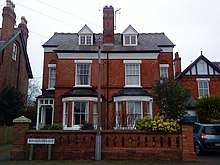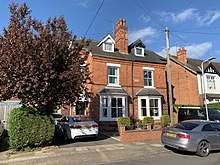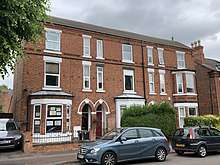John Bowley
John Bowley LRIBA (26 July 1864 - 28 January 1938) was an architect and engineer based in England[1] who worked mainly in Beeston, Nottinghamshire and Hastings.



Architectural career
He was educated at Nottingham University and the Nottingham School of Art.
He was articled to J.W. Eardley of Derby from 1881 to 1884 and assistant until 1886 until he moved to be assistant to W.E. Woolley of Loughborough where he stayed until 1889. He then started his own practice in Beeston at lived at 39 Dovecote Lane.
In 1896 when he moved to Hastings, initially living at 29 Old London Road. He was appointed Architect to Hastings Town Council. He was also resident engineer to the Eastbourne Waterworks Company and consulting surveyor to the Devonshire Park Company.[2] He was also surveyor to the Compton Estate from 1911 to 1927.
He was appointed Licentiate of the Royal Institute of British Architects in 1910.[3]
Personal life
He was born on 26 July 1864 in Ratclife on Soar, the son of Thomas Cross Bowley (1830-1865) and Frances Chadfield (1831-1881).
He married Elizabeth Jane Fertel (1862-1912) in April 1885 and they had two children:
- Frances Elizabeth Bowley (1886-1981)
- John Hugh Bowley (1889-1979)
He married secondly Margaret McLean Agnew in Eastbourne in 1913.
He died on 28 January 1938 in Eastbourne and left an estate valued at £1,540 5s. 1d. His funeral service was held at St Andrew's Presbyterian Church, Eastbourne on 31 January 1938.[2]
Works
- Shops, 2-4 High Road, Beeston 1889 (demolished 1965)
- Sandiacre Schools, 1890 (additions)
- Semi detached houses, 3 and 5 Imperial Avenue, Beeston 1890-91[4]
- Semi detached houses, 7 and 9 Montague Street, Beeston 1891[5]
- Additions to Beeston School, Church Street, Beeston 1891[6]
- Two cottages, City Road, Beeston 1892[7]
- Five cottages, 75 to 83 Chilwell Road, Beeston 1893[7]
- Public house for Shipstones, The City, Beeston 1893[8]
- Semi detached houses, 7 and 9 Imperial Avenue, Beeston 1894[9]
- Houses and shops for Wilkinson, Middle Street, Beeston 1894[10]
- Five cottages, 75-83 Chilwell Road, Beeston 1908 (demolished 2012)
- Three houses, 52-56 Imperial Road, Beeston 1910[11]
- The Residence, Ceylon Place, Eastbourne 1934[12]
References
- Brodie, Antonia (20 December 2001). Directory of British Architects 1834-1914: Vol 1 (A-K). Royal Institute of British Architects. p. 230. ISBN 0826455131.
- "Duke sends wreath". Eastbourne Gazette. England. 2 February 1938. Retrieved 6 May 2020 – via British Newspaper Archive.
- "Resignations". The Journal of the Royal Institute of British Architects. 45: 676. 1937.
|access-date=requires|url=(help) - "869" (1878-1937) [Building Plan Register]. District Council Records, File: DC/BS/4/2/1. Nottingham: Nottinghamshire Archives Office.
- "1033" (1878-1937) [Building Plan Register]. District Council Records, File: DC/BS/4/2/1. Nottingham: Nottinghamshire Archives Office.
- "600" (1878-1937) [Building Plan Register]. District Council Records, File: DC/BS/4/2/1. Nottingham: Nottinghamshire Archives Office.
- "196" (1878-1937) [Building Plan Register]. District Council Records, File: DC/BS/4/2/1. Nottingham: Nottinghamshire Archives Office.
- "212" (1878-1937) [Building Plan Register]. District Council Records, File: DC/BS/4/2/1. Nottingham: Nottinghamshire Archives Office.
- "868" (1878-1937) [Building Plan Register]. District Council Records, File: DC/BS/4/2/1. Nottingham: Nottinghamshire Archives Office.
- "1058" (1878-1937) [Building Plan Register]. District Council Records, File: DC/BS/4/2/1. Nottingham: Nottinghamshire Archives Office.
- "877" (1878-1937) [Building Plan Register]. District Council Records, File: DC/BS/4/2/1. Nottingham: Nottinghamshire Archives Office.
- "Eastborne's most modern flats". Eastbourne Gazette. England. 19 December 1934. Retrieved 6 May 2020 – via British Newspaper Archive.
| Wikimedia Commons has media related to John Bowley. |